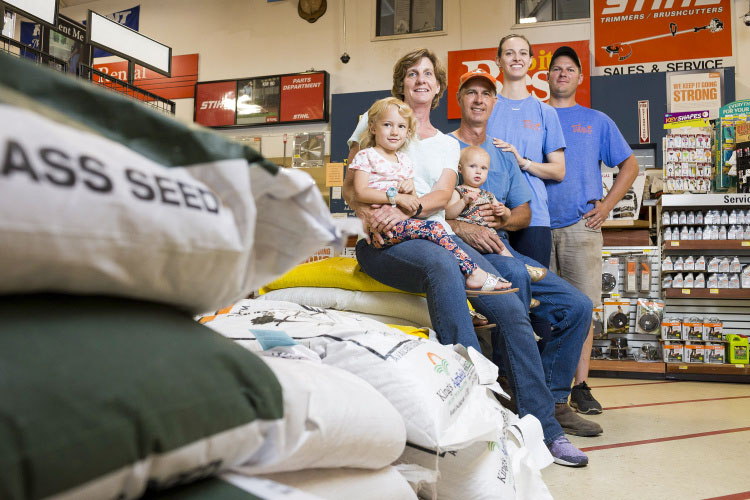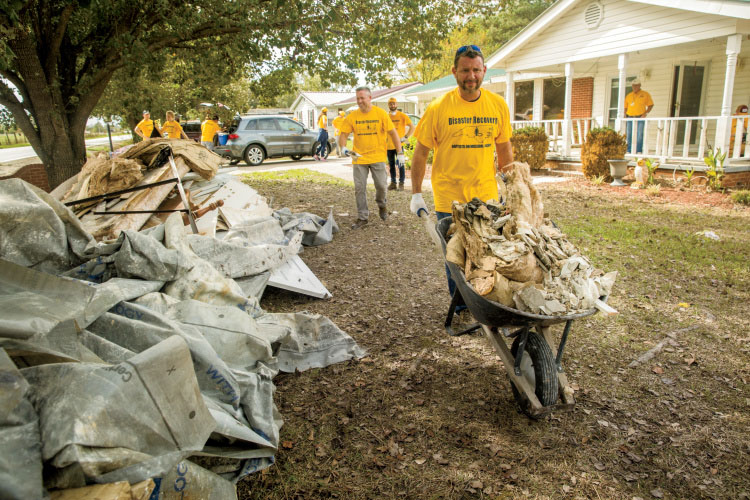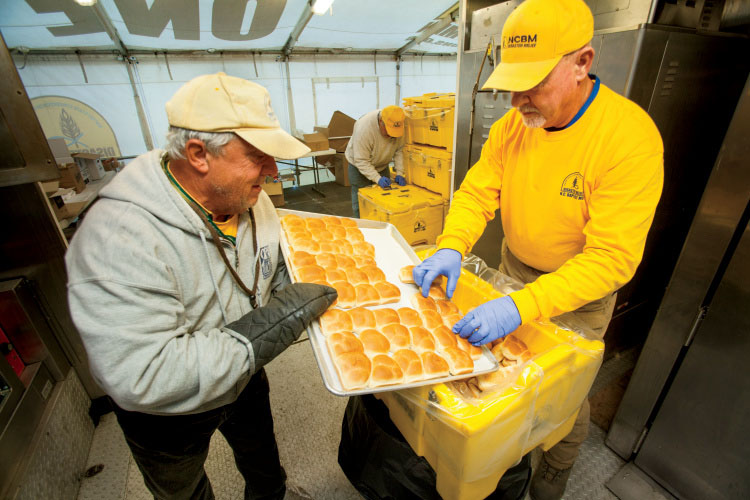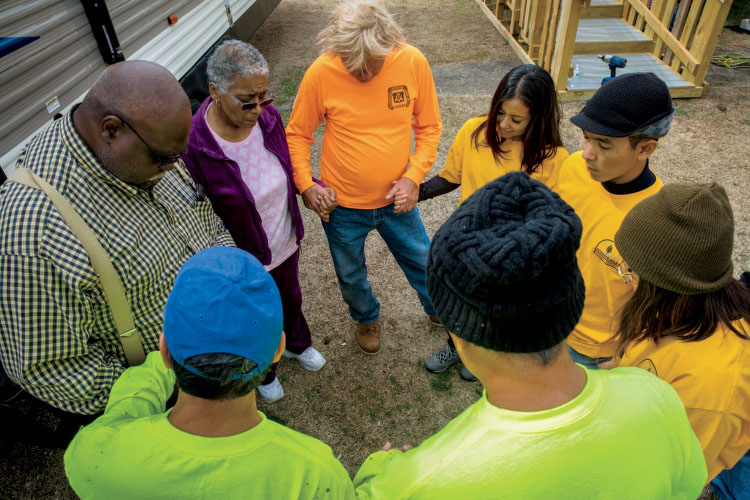Farm Families Find Hope After Hurricane Florence
Support helps farm families recover from Florence.
Joanie Stiers |
Hurricane Florence didn’t just destroy the crops and land and buildings in its path, though that was no small matter. One major casualty of the storm was the loss of hope by those whose livelihoods were affected.
The End of an Era
Like every other farmer in eastern North Carolina, Willie Howell finished harvesting tobacco last year the day Florence hit.
“When I looked out across my tobacco fields two to three days after Florence and the tobacco was dying, I felt so deflated and discouraged,” says Howell, then a lifelong farmer in Wayne County and president of the county’s Farm Bureau. “My passion for farming just died right there.”
The tobacco was an unrealized bumper crop that he needed to keep the farm financially afloat. His father, who had been his farming partner, had passed away nine months prior, leaving Howell alone to face debts from previous crop years.
At age 45, Howell liquidated assets to pay off creditors and quit farming, a profession that runs at least six generations deep in his family. He tearfully ended relationships with landowners from whom his family had rented land, some for decades. He felt as though he had failed his family, his loyal employees and his father’s legacy.
See more: Helpers in Hurricane Relief

Instead, they helped him find hope. Today, he spends more time with his family and church and works as a regional agronomist for the North Carolina Department of Agriculture, putting his master’s degree to use.
“I think it’s going to work out for the good,” Howell says. “God had a plan for me in the beginning. On the back side of this, I will be a stronger individual.”
Goal: Better Than Before
Many farmers, like Howell, walked away from farming in the wake of Florence. Others, like cattleman Buron Lanier, decided to persevere. He estimates it will take a couple of years for his Pender County farm to recover its grass base for grazing cattle. In the meantime, he and his wife, Sara, have downsized their cattle herd by half and keep their best heifer calves to rebuild the herd.
Selling out had crossed their minds until small doses of hope arrived. One such relief was the Pasture Renovation Seed Initiative, a project of the North Carolina Farm Bureau Hurricane Relief Fund that allows producers with storm-impacted pastures to apply for free seed.
See more: 2 Ministries on a Mission to Aid in N.C. Hurricane Recovery
“If you were able to get a few bags of seed to get started, it gave you hope that there was an option and a strategy you could use to recover,” Lanier says. “These support programs have given us a chance to keep going. If we didn’t have any help whatsoever – seed or recovery money – it would have been hard to ever redo and get the farm back going.”

Florence flooding killed more than a quarter of the farm’s grassland. The seed initiative is helping reestablish their farm’s grasses with a diversified mix of warm- and cool-season annuals and perennials.
“The flood forced us to diversify and learn how to be more sustainable, have more variety in our forages and how to bounce back and land on our feet,” Lanier says.
Florence Recovery Continues
One year after the hurricane, farm families in eastern North Carolina are still recovering from the biggest natural disaster they have ever experienced. And while Florence’s financial impact continues to make headlines, it is the emotional recovery that plagues so many farmers, a breed of people who have put their time, energy and love into their land. They can feel a profound failure even with circumstances beyond their control.
The North Carolina Farm Bureau Foundation contracted with therapist Deborah Dunn to give a series of motivational talks at workshops throughout eastern North Carolina. She spoke on how to cope emotionally during difficult times and followed up with free counseling sessions for farmers in attendance.
According to Dunn, many farmers she speaks with feel trapped. Farming is all they have known from childhood. It’s an in-their-blood way of life, sometimes on land their ancestors toiled and in farm businesses their families spent their lives building.

“Fear sets in, leading to a kind of hopelessness that can be deadly,” says Dunn, who pursued a career in therapy after selling out of farming and recovering from the suicide of her 26-year-old brother. “No matter how dire a situation, there is always something that can be done. The more hopeful we are, the more positively we speak and think, the more likely we are to overcome our problems and move on to a better place.”
Dunn encourages people to choose hope and to seek help.
Howell agrees that speaking out helps. “Talking about it is part of me coping with quitting farming and moving ahead with a different job and different outlook on life,” he says. “If you’re facing something, let someone know. Find a support group, whether family, other farmers, a close friend, your church family, your pastor. Tell somebody.”
See more: How to Prepare for the Calm Before the Storm

Organizations Deliver Hope
Many of those affected by Florence found encouragement and support in their communities. From free seed for cattle pastures to hot meals and mud-outs, various organizations stepped up to help rural families find hope in North Carolina.
“Hope is the most important thing that volunteers can provide to people who are hurting,” says Richard Brunson, executive director of Baptists on Mission. “They need to know that people care about them and they are going to get through it.”
Baptists on Mission, a nonprofit providing support to North Carolinians in need, served more than one million hot meals immediately after Florence. Today, volunteers continue with recovery and rebuild efforts, such as mud-outs, tear-outs and the reconstruction of homes, an estimated three-year process.
“We need skilled and unskilled volunteers now and for the next three years,” Brunson says. “As time goes on it gets harder to find volunteers. It’s kind of out of sight, out of mind.”
Baptists on Mission still needs volunteers to help rebuild after Florence. To join the effort, go to baptistsonmission.org and click “Get Involved.”Volunteers Needed
The road to recovery post-Florence may be uphill, but there are many reasons to be hopeful. “When you see a little light, one thing happens after another and you have things going to help you survive,” Lanier says.
Florence may have knocked them down, but North Carolina farmers have grown more resilient and have risen to the challenge of rebuilding. Looking forward, adaptability and a hopeful attitude are keys to a brighter future.
“We are going to be stronger and more survivable than we were before the storm,” Lanier says.

You’re not alone. One in five U.S. citizens experiences a mental health or substance use disorder. Blue Cross North Carolina suggests its members first seek help from a primary care physician (PCP) to discuss their situation and determine treatment options. Members also can locate an in-network behavioral health specialist through the online member portal at bluecrossnc.com or by calling customer service at (877) 258-3334. In 2020, Blue Cross North Carolina has plans to make behavioral health treatment more available and convenient for members. Members should watch for new in-state providers of behavioral health treatment and enhanced tele- and digital options for therapy, which can take treatment beyond clinic walls. Blue Cross North Carolina is innovatively integrating behavioral health into primary care, placing both primary care and mental health providers at the center of patient care. The company’s collaboration with Quartet Health will allow many new services, including therapy via video-conferencing from the comfort (and privacy) of a farm or home. For more information on these emerging services, visit bluecrossnc.com. Working in agriculture can simulate an emotional roller coaster. The North Carolina Agromedicine Institute can help farmers discover their stressors, identify signs of depression and anxiety, and provide them with tips to reduce stress. Find more information at ncagromedicine.org. In crisis? Call the National Suicide Prevention Hotline at 1-800-273-TALK (8255) or text 741741 to talk with a trained crisis counselor from the Crisis Text Line.Feeling Overwhelmed?
– Joanie Stiers


